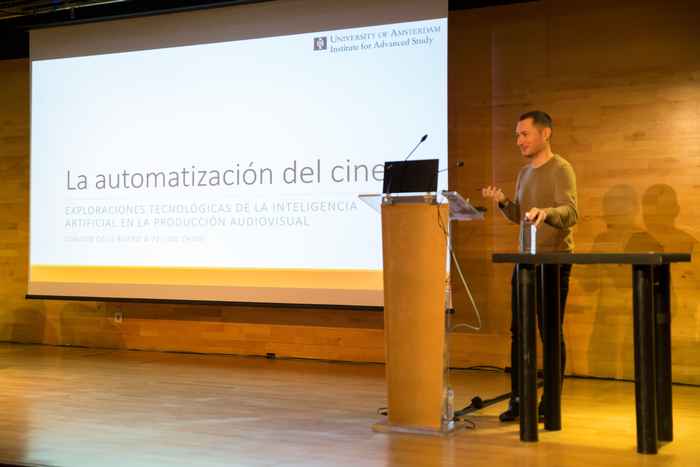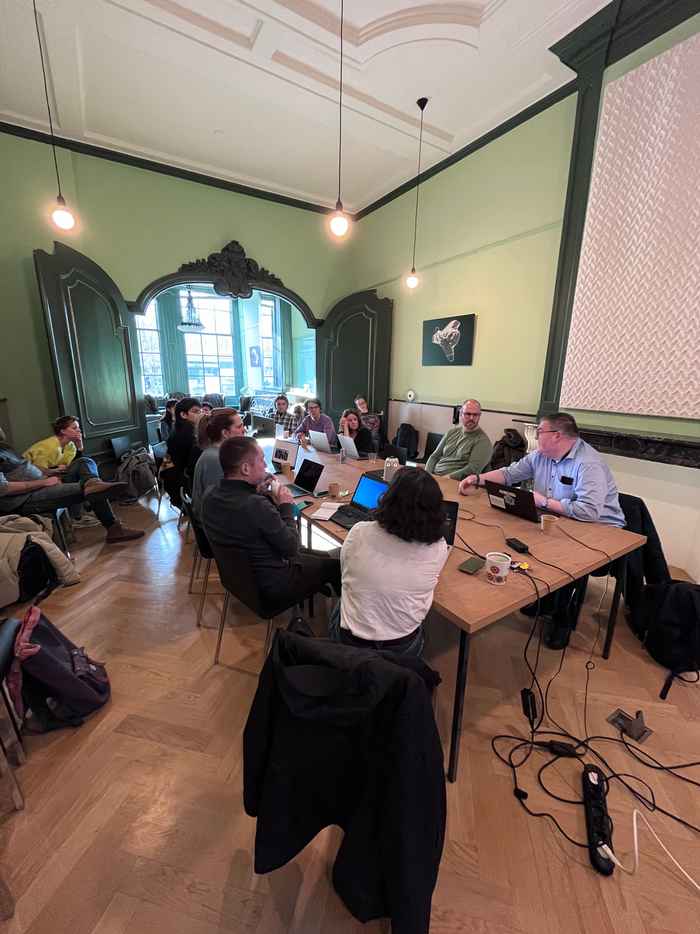Interdisciplinary Co-productions at IAS: Our Joint Fellowship on AI and Culture
Blog by Alumni Fellow Pei-Sze Chow and Claudio Celis Bueno
18 March 2024
Early on in our fellowship (April 2023) we presented some methodological reflections at the AI, Media, and Democracy (AI4DEM) lab. This was an important moment for us to connect with ongoing and emerging research in an adjacent area and we appreciated the intersections with the work being done there in journalism and broadcast media. It also allowed us to share insights regarding different methodologies to study AI-related phenomena, strengthening the interdisciplinary aspects of our project.

A key highlight of our fellowship—and something that we continue to foster—was organising the Interdisciplinary Seminar Series on AI & Culture. Now in its second season, we bring together colleagues from the humanities and computer science to speak to a topic of shared interest. Issues such as machine vision, deep fakes, predictability, biases, and creativity have been discussed in this series. These events are open to all and the Sweelinck Room was, and continues to be, filled with very intense discussions between participants from a rich range of disciplinary backgrounds. The seminars continue to gain attention from diverse participants and have truly enriched the interdisciplinary drive behind our project. We are convinced that the collaborative and diverse environment provided by IAS has been one of the key elements behind the success of the series.

Due to how much AI has been in the public sphere over the past years, it was inevitable that our work caught the attention of people in the film industry. In June 2023 we were invited to the +RAIN Film Festival in Barcelona - "Europe’s first AI Film festival” - to share our research to a wider audience that included film practitioners, policymakers, technologists, and academics. This was followed by presentations at various academic and non-academic events throughout our fellowship: the International Association for Media and Communication Research (IAMCR) conference in Lyon (July 2023), Márgenes film festival in Madrid (December 2023), and Cinematic Precarity workshop in Oxford (January 2024).
Closer to home, we have been part of the ARIAS network on Artificial Worlds. This was for us a very insightful opportunity to interact with artists who are currently working with AI and to understand the ways creativity is being re-thought and re-assessed by this group of practitioners. In this context we organised the workshop Who combines what? Generative AI and the where of creativity at the AHK Culture Club (November 2023).

Thanks to the time and space that IAS offered us, we could step out of our disciplinary ‘home’ of Media Studies (even though it is conveniently located around the corner in central Amsterdam), and this was for us very valuable. Despite us both being located in Media Studies, we are each in different teams (Claudio in New Media, Pei-Sze in Film), so even within the same department we rarely had the chance to work closely together. Thus, the ability to step away, physically and mentally, from our departmental duties, even for a moment, meant that we could focus on deepening our collaborative research.
We now have a paper due to be published in AI & Society [preprint], which presents the main conceptual and methodological contributions of our project, and which sets the basis for our empirical work. A second paper that focuses on the empirical ethnographic work we have conducted during our fellowship is in the making. We are grateful for the opportunity and for all the doors that our fellowship at IAS opened for us and for our research, and we look forward to continuing our collaboration with future activities at IAS.
Publications:
- Celis Bueno, C., Chow, P., and Popowicz, A. 2024. Not ‘what’, but ‘where is Creativity?’: towards a relational-materialist approach to generative AI. AI & Society. [Accepted; preprint here]
- Currently writing another article based on our empirical research.
Events Organised:
- Interdisciplinary Perspectives on AI & Culture: Art and Science In Conversation (Spring 2023)
- Interdisciplinary Perspectives on AI & Culture: Art and Science In Conversation (Spring 2024)
- Challenging Deterministic Narratives of AI: Approaches to Studying Cultures of AI Production (February 2024)
Academic and Non-Academic Presentations:
- Meet new Methods (April 2023). AI, Media and Democracy Lab, Amsterdam.
- Automating Cinema: A Materialist Approach to Creativity in the Age of AI (June 2023). +RAIN Film Festival, Barcelona.
- Creative aid or artificial prop? Artificial intelligence tools in film production (July 2023). IAMCR, Lyon.
- Who combines what? Generative AI and the where of creativity (November 2023). ARIAS Artificial Worlds, Amsterdam.
- La automatización del cine: exploraciones tecnológicas de la inteligencia artificial en la producción audiovisual (December 2023). Márgenes Film Festival, Madrid.
- Precarious Creativity: The use of generative AI in the film industry (January 2024). Cinematic Precarity Conference, Oxford.